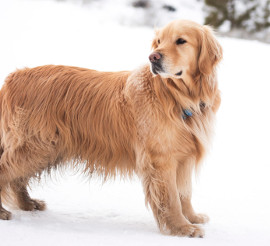 The winter season is a revolving door of harsh outdoor conditions. From damp and cool, to frigid and dry, the season can be particularly harsh on your pup’s sensitive paws.
The winter season is a revolving door of harsh outdoor conditions. From damp and cool, to frigid and dry, the season can be particularly harsh on your pup’s sensitive paws.
While a dog’s pads may have been tough and sturdy with their wild ancestors, many modern-day canines have evolved to have much softer, more sensitive pads.
Taking some simple outdoor precautions can prevent damaged, chapped, and painful paws.
The most common concern among pet owners is ice and snow protection. While dogs are better equipped to tread in blustery conditions than barefooted humans, dog feet are still susceptible to everything from mild irritation to frostbite. Ice, slush, and dense snowballs build up, especially between the toes, which can be extremely painful. Their feet may also pick up little bits of stone and other items that are unpleasant to walk on. Continual exposure to the cold, damp ground may also cause pads to dry out and crack. This can be very painful, and could lead to other complications, like infection.
Be on the lookout for telltale behaviours like compulsive licking of sore feet. Your dog may be trying to mend itself, however excessive licking almost always makes it worse.
Salt used on roadways and sidewalks is also a big concern for pet owners. These chemicals increase the risk of dry, chapped paws, and expose your dog’s feet to potentially harmful substances.
So how do you protect your dog’s paws to maximize the quality of their outdoor time?
The easiest and most obvious way to protect your dog’s paws is by putting boots on them. There are a wide variety of boots on the market to suit every pet’s needs. Disposable rubber boots are by far the most popular choice for universal winter protection. Like a balloon, they stretch to fit snugly on feet of every shape and size. The advantage with these boots is they are less restrictive, allowing the foot’s natural movement. This tends to be a more comfortable option among dogs who refuse to wear more bulky, sturdier boots. Rubber boots provide a great insulating barrier from cold, snow, ice, water, and salt – think of them as dish gloves for your dog’s feet. With that said, these boots do not offer much protection from sharp objects, and they do need to be replaced as they wear out. For dogs needing a little extra protection, a boot with a thicker sole would be the better choice.
The sensation of wearing boots is not natural for dogs, which is why many dogs have difficulty adjusting – at first. There are many factors to consider when it comes to boots. Considering the material, flexibility, durability, and ensuring a proper fit will help even the most boot-resistant dogs adapt quickly. The key is to be patient and persistent.
An alternative to doggy boots is to use a balm. There are some great balms on the market perfectly designed to combat Canadian winters. Balms provide a temporary protective coating on your dog’s paws, acting as a barrier between their feet and the ground. Not as protective as boots, but they certainly help shield against harsh chemicals, debris, and cold harming delicate tootsies.
Not all dogs need foot protection. Many breeds are at their best when temperatures drop. Small breed dogs are generally not bred for unforgiving weather conditions, so they are the ones needing the most consideration throughout the winter.
No matter what you choose, being preventative about foot protection is best. Foot and pad injuries can be difficult to heal quickly, as dogs seldom rest long enough to mend. Oftentimes, one small foot injury becomes a big problem if not treated early.
Checking your dog’s paws after every walk gives you the opportunity to identify any problems from the onset. Be sure to examine the pads of the feet, and check for cuts, cracks, and abrasions. Check between the toes, too. If you notice any signs of sensitivity, talk to a pet health professional to determine what option is best for your pooch.
Brandon Forder – also known as The Pet Expert – is vice-president of Canadian Pet Connection, a family-owned and -operated business located in Meaford. He has over twenty-five years of experience specializing in pet nutrition, behaviour, and healthy pet lifestyles. Canadian Pet Connection is an industry leader committed to providing their clients with the highest levels of personal, attentive service. Learn more at www.CanadianPetConnection.ca.











